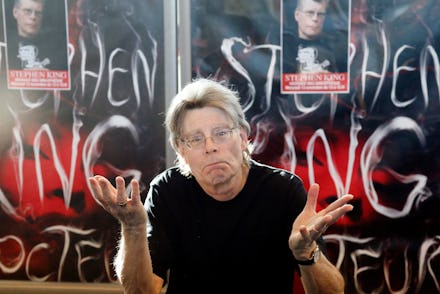Stephen King Tweeted the Most Offensive Thing Possible About Dylan Farrow

Updated: Feb. 5, 1:45 pm
When deciding how to craft the perfect Twitter reaction to public accusations of child abuse, a good rule of thumb is not to suggest that the alleged survivor is a bitch.
Nevertheless, on Monday author Stephen King did just that when he weighed in on Dylan Farrow's harrowing New York Times essay, in which she chronicles her alleged sexual abuse by her father Woody Allen.
The tweet has since been deleted. King quickly proceeded to say he "probably used the wrong word" (no shit) and to ask for mercy — which is ironic, given that this is exactly what he failed to show towards Farrow.
King again copped to his error, which is a good thing. But his tweet is part of a much larger issue in how our culture has handled this situation and others like it. Women who come forward with allegations of abuse are frequently painted as unstable deviants whose accounts of assault are more often attacked than understood.
Think about what King was saying. Regardless of whether you believe that Allen is guilty or that Mia Farrow had a hand in encouraging false memories in the mind of her then 7-year-old daughter, the phrase "palpable bitchery" signifies that this woman spoke up for herself out of maliciousness and spite, rather than out of a desire for justice and healing. Dylan Farrow must live with these memories every day. So how can a vague, gendered notion of "bitchery" be used to undermine her words?
The exact language we use when approaching cases of alleged sexual abuse is incredibly important. Speaking out after sexual assault can be very, very painful. Frankly, it can be mortifying. And the messages society sends about how survivors will be perceived after the fact matter — especially considering that an average of 60% of rapes aren't even reported to the police. And of those that are reported, only 3% of rapists will go to jail for their crime.
Image Credit: RAINN
King is a superstar author with 300K Twitter followers. Dylan Farrow doesn't have a Twitter account. In fact, she doesn't even go by the name Dylan Farrow anymore. When it comes to the balance of power, both King — and Allen — have far more clout than does Farrow, before even taking into account the additional privileges surrounding credibility and rationality that their gender affords.
This is why we need to treat her with respect, even if we can't take what she says as irrefutable fact. Her story deserves to be heard and considered just as much as the many pieces that have been written defending Allen. Charges aren't being pressed, and this will likely fade again from public consciousness as Allen continues to make movies (and money). The fact that he was just honored with the lifetime achievement award at the Golden Globes and had a film nominated for yet another Oscar this year (his 24th nomination) only goes to show that we've been willing to dismiss this woman for far too long.
But if her story is true, that means she's writing it for other survivors to take comfort in the fact that she did not stay silent, even when going against a beloved public figure that just as many have rushed to defend as have rushed to demonize. We owe it to her to listen — and at the very, very least, not to call her a bitch for telling her side of the story.